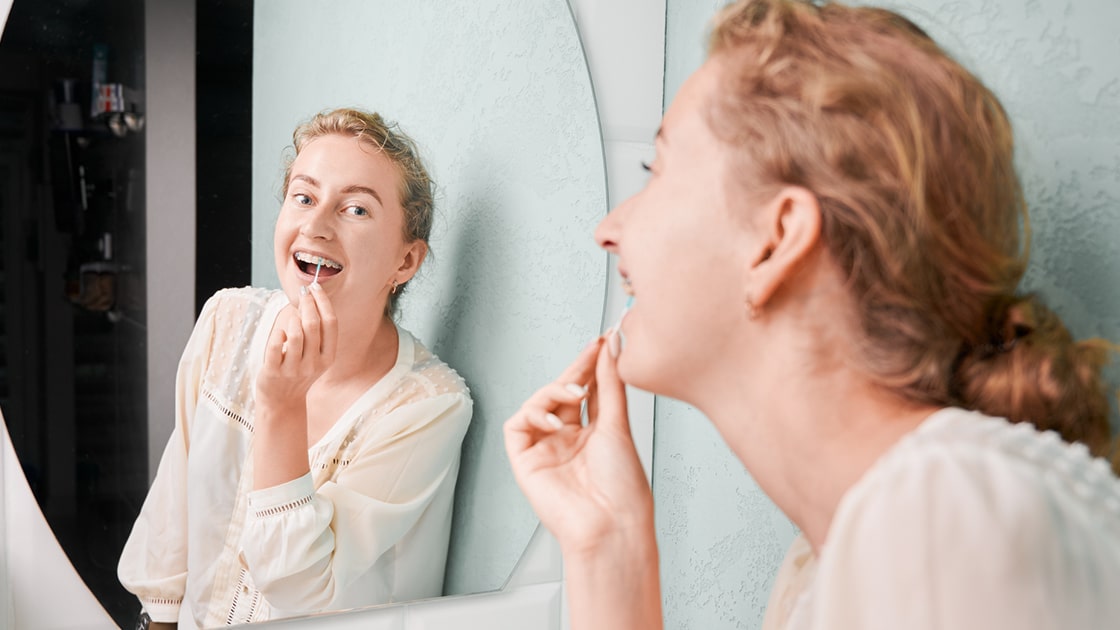
During orthodontic treatment, your day to day activities and dietary habits should remain much the same.
When most people think about having braces, they assume that there will be many foods and activities that they will not be able to enjoy. You will still be able to savor eating out, singing, playing a musical instrument or sport, or even having pictures taken. We are happy to answer any questions you may have about life with braces.
Carefully follow the instructions provided by our office regarding your orthodontic care. Specific steps may vary depending on the type of braces you have.
Brushing
Carefully follow all instructions you are given regarding your dental care. Specific steps may vary depending on the type of braces you have. Be sure to brush thoroughly after any meal or snack. It is important to keep your teeth and braces as clean as possible to avoid potential problems. Also, rinse with water or mouthwash after brushing. It’s a good idea to carry a travel toothbrush when you will be away from home. Before going to bed at night be sure to brush thoroughly and floss carefully. It may take a little extra time but this is an important step in maintaining your oral hygiene on your way to a better smile and healthier teeth.
Use a soft rounded-bristle toothbrush that is in good condition. Toothbrushes will wear out faster and need to be replaced more often when wearing braces, so be sure to keep some spare toothbrushes on hand. When brushing you should also brush your tongue and rinse thoroughly when done.
Flossing
- While flossing may take a little more time and practice, it is a vital part of good oral hygiene during orthodontic treatment.
- You may need a floss threader to pull the floss under the archwire.
- You should always clean along and under the gum lines with floss each night before going to bed.
- After you have brushed and flossed, your braces should look clean and shiny, making it easy to see the edges of the braces.
Please let us know at your next appointment if you have tips or tricks to make brushing or flossing easier.
General Guidelines:
- Try to choose softer foods and cut larger foods into smaller pieces rather than trying to bite through them, especially at the beginning of your orthodontic treatment.
- Always chop whole fruits such as apples or pears into bite-sized pieces before eating
- Always avoid chewing on ice.
- Avoid any particularly hard, chewy, crunchy, or sticky food. These foods can loosen, bend, or even break your brackets or appliances.
- After eating, check your braces for any loose or broken appliances. If you find any problems, please give our office a call so that we can make any needed adjustments.
Examples of Foods that You Can Eat:
- Bread: Bread, Pancakes, Muffins (no nuts), Soft Tortillas
- Grains: Rice and Pasta
- Fruits: Applesauce and Bananas
- Vegetables: Mashed Potatoes, Beans, and other Steamed Veggies
- Meats and Seafood
- Dairy: Yogurt and Soft Cheeses
- Treats: Ice Cream, Cake, Soft Cookies, and Pudding
Examples of Foods to Avoid:
- Whole Foods such as Apples, Pears, Celery
- Chewy Foods such as Bagels, Granola Bars, Gummy Candies
- Hard Foods such as Nuts, Hard Candies
- Crunchy Foods such as Tortilla Chips, Pretzels, Cheetos
Dental wax can be a very useful tool to keep on hand during orthodontic treatment. Take a small piece of dental wax between your fingertips and roll it into a ball. Gently press the ball over any orthodontic brackets or wires that might be irritating your mouth or gums. At your appointment, please let us know if you have to use wax regularly so that we can make any necessary adjustments.
During your orthodontic treatment, your doctor may have you wear elastics, aka "rubber bands," to adjust your overall bite pattern and arch development. Typically attached from brackets on the upper arch to the lower arch, elastics use tension to create subtle changes in the teeth and bite. When you start wearing elastics, you may experience some tenderness, but the tenderness should subside after a few days. Over-the-counter medications like Ibuprofen should help, but if the soreness continues for more than a week, please give our office a call. You must always wear your elastics as directed. Wearing your elastics only occasionally will prolong your overall orthodontic treatment and cause you to experience persistent tenderness.
Wearing Elastics (Rubber Bands):
- Remove elastics when eating and brushing your teeth.
- Always replace your elastics after brushing your teeth.
- If a rubber band breaks, please replace the broken one and the elastic in the exact location on the other side to ensure the same amount of force is applied on each side.
- Always have extra elastics on hand in case one should break.
- If you think you might run out of elastics, please call us, and we can mail extras to you.
Keep these materials on hand to help with the most common orthodontic maintenance and minor emergencies:
- Interdental or Proxabrushes fit between teeth and help patients to clean around wires without damaging them.
- Water Piks are also useful for clearing away food debris from the brackets without damaging them.
- Non-medicated orthodontic relief wax can be placed over brackets or wires that may be irritating gum tissues.
- Antibacterial Mouthwash can be used to reduce inflammation and prevent infection. For minor sores in the mouth, Peroxyl, an antiseptic rinse containing hydrogen peroxide, may be used up to 4 times per day after brushing. Refer to the product label for specific instructions.
- Dental floss, an interproximal brush or a toothpick can be used for removing food that gets caught between teeth or wires.
- Sterile tweezers can be used to replace orthodontic rubber bands that have come off.
- Salt is used for warm salt-water rinses, which help heal sore gums and tissues in the mouth.
- Non-prescription pain relievers, such as acetaminophen or ibuprofen, can help with the temporary discomfort that sometimes occurs for the first day or two after an orthodontic adjustment.
- Topical Anesthetic Treatments, such as Orabase or Ora-Gel, can be applied with a Q-tip to any abrasions or sores in the mouth should they occur.
Please note that NONE of the ITEMS listed above are a replacement for FLOSSING.
If you have a removable orthodontic appliance, it is important to clean it each night and morning to remove dental plaque. Remove the appliance and clean it with a toothbrush and toothpaste.
- The patient is to wear at night only (while sleeping)
- The patient needs to remove retainers while eating and or drinking, and PUT THEM IN THEIR CASE, *****DO NOT WRAP IN PAPER TOWEL, you will throw it away!!! (your insurance ONLY covers 1 set of retainers, any replacement ones are $150 upper & $150 lower, a total of $300 for both!)
- The patient needs to clean retainers once a day with water and a toothbrush and let air dry in case
- DO NOT leave it anywhere close to where a dog can get to it, THEY WILL CHEW IT UP!!!!
- If the patient notices the retainer is rubbing a sore on their gums, or it is sharp on a certain area, you can use an emery board on the retainer to file down and smooth the area. If this does NOT help and it is still bothering the patient, please call our office and make an appt. for us to look at it.
- If retainers are not fitting the patient properly, ( falls out when they are sleeping, or can’t get it in mouth ) please call our office and make an appointment for us to look at it, and you will NEED TO BRING IT IN WITH YOU FOR US TO LOOK AT IT!!!
- If the patient does NOT wear their retainers as instructed to wear, THEIR TEETH WILL SHIFT AND MOVE!!!!
Our office can make a custom mouthguard fitted to your child's mouth for the highest level of comfort and protection. Be sure to bring your child's mouthguard to their orthodontic appointments so we can check it for wear and tear and ensure it still fits you well.
If your child experiences an accident while playing sports, check their mouth and orthodontic appliances for any signs of damage. If any of your child's teeth feel loose or appliances are broken, please call our office. Gently rinsing the mouth with warm salt water can help alleviate discomfort and expedite healing. You can also apply dental wax to any loose appliances causing discomfort.
Solutions for Common Orthodontic Concerns:
You may notice some soreness or discomfort when starting orthodontic treatment or even your braces are adjusted.
Here are some useful items that may help alleviate any discomfort you may experience:
- Non-prescription pain relievers: Acetaminophen or ibuprofen can be effective in treating soreness. Take any medications according to the directions or your doctor's instructions.
- Topical anesthetic treatments: Orabase or Ora-Gel can provide pain relief for abrasions or sores.
- Orthodontic Wax: Non-medicated wax can be placed over brackets or wires that may be irritating.
- Soft Diet: A diet of soft foods for a day or two can help reduce soreness while your mouth is adjusting.
- Warm Salt Water Rinses: Rinsing your mouth several times a day with warm salt water (1 tsp. of salt in 8 oz. of warm water) can help with discomfort and accelerate the healing of any sores or cuts.
There are two types of ligatures that can be used to attach your archwire to the orthodontic brackets on each tooth. These ligatures may be tiny rubber bands or small, thin wires.
- If a rubber band ligature comes off, you can try to put it back into place by using clean tweezers.
- If a wire ligature comes off, you can also use clean tweezers to remove the wire.
- If the wire is poking your mouth but is not coming off, it may be possible to use a Q-tip or clean pencil eraser to bend
- the ligature down away from the tissue.
- Let our office know about the problem so that we can decide if we need to see you before your next scheduled appointment.
If your archwire is sliding out of place and poking your cheek, use a Q-tip or pencil eraser to try to push the wire against the tooth. If this is not possible or if the wire is still uncomfortable, place some dental wax over the end of the wire and call our office to set up a time to have the wire adjusted and put back into place.
You can use dental floss, an interproximal brush, or a toothpick to remove food that gets caught between teeth or wires. Sometimes tying a knot in the dental floss before threading it through the brackets can help to grab and remove the food.
